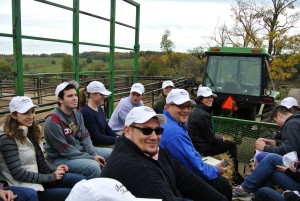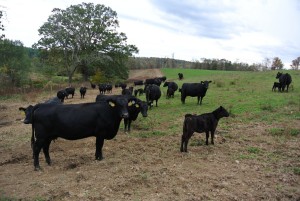Johns Hopkins Students Visit Roseda Farm
Johns Hopkins University recently signed the Real Food Campus Commitment at an ambitious 35%. Asked about the impetus for the commitment, Bill Connor, director of dining services for Johns Hopkins University, told the Washington Post, “We’re at the forefront in academics and research; why would dining not want to be at the same forefront?”

General Manager Ty Paup and Executive Chef Robert Lavoie (center) go on a haystack ride with Johns Hopkins students through Roseda Farm
At Bon Appétit Management Company, we couldn’t agree more. That’s why Bon Appétit Executive Chef Robert Lavoie, General Manager Ty Paup, and Senior Fellow Nicole Tocco were delighted to take a group of Johns Hopkins students studying the politics of food this fall along on a visit to Roseda Farm in Monkton, MD. The goal: Give them firsthand knowledge of how supporting a sustainable food system means being more than just willing to pay a higher price.
Nearly all of the beef that Bon Appétit serves at Johns Hopkins comes from Roseda Farm. One of Bon Appetit’s 1,500-plus registered Farm to Fork partners, Roseda Farm uses intensive rotational grazing, a practice that keeps both its cows and pastures healthy by moving cattle to fresh grasses while letting grazed areas recover. When the cows aren’t able to be on grass, Roseda gets creative through a partnership with Troegs Brewing Company; part of the cows’ supplemental diet is spent barley used in the beer brewing process. The ranch is also designed to prevent runoff into local waterways and boasts a vast array of solar panels, which now produce more electricity than the farm needs.
Not only is Roseda beef locally raised, it’s locally processed. Mike Brannon, vice president for Old Line Custom Meat Company, which processes and packages the beef from Roseda Farm, explained that he has been working with Bon Appétit chefs in the mid-Atlantic for more than 10 years. Mike explained to the group that when you’re selling a whole cow, customers vary dramatically in their ability and willingness to be flexible. High-end restaurants will pay a premium for the local, pasture-raised beef that Roseda offers, but they typically only want certain cuts (usually tenderloins). The problem is, each cow only has a couple of those. So Mike explained that our chefs at Goucher College, and now Johns Hopkins as well, play a critical role in Roseda’s continued growth and survival by being willing to work with other cuts of the animal, depending on what Old Line and Roseda need help moving.
That’s the kind of commitment that sustains the Real Food Challenge and the planet!
